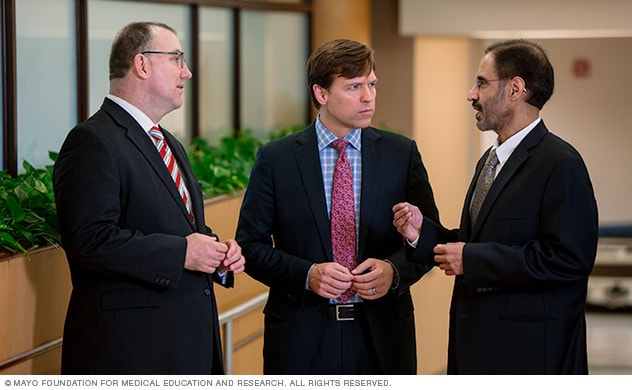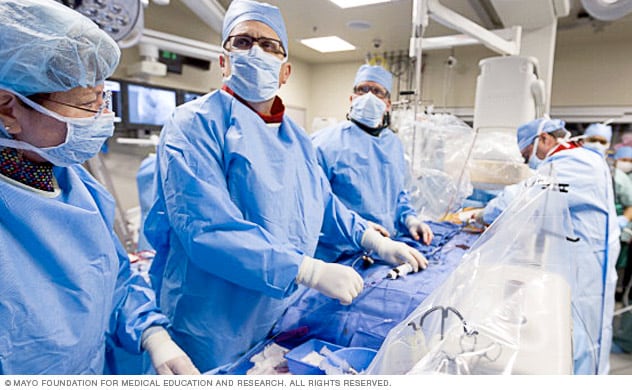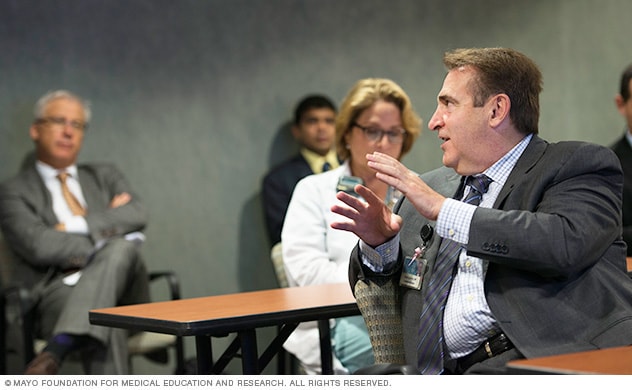Mayo Clinic's approach
 Mayo Clinic care team
Mayo Clinic care team
A team of doctors discusses care for people who may have transcatheter aortic valve replacement, also called TAVR.
At Mayo Clinic, doctors trained in heart diseases, such as interventional cardiologists and noninvasive cardiologists, work with cardiovascular surgeons, radiologists, anesthesiologists, nurses and others to provide coordinated, comprehensive care for people who need transcatheter aortic valve replacement, also called TAVR.
- Collaborative care. Healthcare professionals at Mayo Clinic provide care for you as a whole person. Your healthcare team takes the time to get to know you and works with you to provide exactly the care you need.
- Comprehensive evaluation. At Mayo Clinic, people with aortic valve stenosis are carefully examined by a multidisciplinary team of heart valve specialists to determine the best treatment option. This important step helps doctors know if TAVR or open-heart aortic valve surgery is needed, or if another treatment may be more appropriate. TAVR is one of several treatment options available for aortic valve stenosis at Mayo Clinic.
- Advanced technology. Mayo Clinic healthcare professionals use advanced imaging technology to help them plan and perform TAVR. In addition to TAVR, Mayo doctors have experience performing a wide range of cardiac catheterization procedures to treat various heart conditions.
- Innovative research. Mayo Clinic researchers have been involved in many studies related to TAVR. Doctors and researchers at Mayo Clinic develop and test advanced technology and techniques used to care for people with heart valve disease.
 Cardiac catheter procedures at Mayo Clinic
Cardiac catheter procedures at Mayo Clinic
Mayo doctors have experience performing catheter procedures to treat many heart conditions.
Expertise and rankings
 Team collaboration at Mayo Clinic
Team collaboration at Mayo Clinic
A team of doctors and other staff collaborate to provide care for people who may need transcatheter aortic valve replacement, also called TAVR.
Experience and expertise
Mayo Clinic cardiologists and cardiovascular surgeons have specialized training and expertise in evaluating and treating people who may need transcatheter aortic valve replacement, also called TAVR. Mayo doctors in the Valvular Heart Disease Clinic examine and treat people with aortic valve stenosis and other heart valve diseases.
Mayo doctors perform more than 740 transcatheter aortic valve replacement procedures each year.
Nationally recognized expertise
Mayo Clinic campuses are nationally recognized for expertise in cardiology and cardiovascular surgery:
- Mayo Clinic in Rochester, Minnesota, Mayo Clinic in Phoenix/Scottsdale, Arizona, and Mayo Clinic in Jacksonville, Florida, are nationally ranked for heart and heart surgery by U.S. News & World Report 2025-2026.
- Mayo Clinic Children's in Rochester is ranked the No. 1 hospital in Minnesota, and the five-state region of Iowa, Minnesota, North Dakota, South Dakota and Wisconsin, according to U.S. News & World Report's 2024-2025 "Best Children's Hospitals" rankings.
- Mayo Clinic in Rochester, Minn., Mayo Clinic in Jacksonville, Fla., and Mayo Clinic in Phoenix/Scottsdale, Ariz., are ranked as high performing for aortic valve replacement and transcatheter aortic valve replacement (TAVR) procedures by U.S. News & World Report. "High performing" is a designation given to the top 30% of TAVR programs across the nation (240+ programs).
With Mayo Clinic's emphasis on collaborative care, specialists at each of the campuses — Minnesota, Arizona and Florida — interact very closely with colleagues at the other campuses and the Mayo Clinic Health System.
Learn more about Mayo Clinic's cardiovascular medicine and cardiovascular surgery departments' expertise and rankings.
Locations, travel and lodging
Mayo Clinic has major campuses in Phoenix and Scottsdale, Arizona; Jacksonville, Florida; and Rochester, Minnesota. The Mayo Clinic Health System has dozens of locations in several states.
For more information on visiting Mayo Clinic, choose your location below:
Costs and insurance
Mayo Clinic works with hundreds of insurance companies and is an in-network provider for millions of people.
In most cases, Mayo Clinic doesn't require a physician referral. Some insurers require referrals or may have additional requirements for certain medical care. All appointments are prioritized on the basis of medical need.
Learn more about appointments at Mayo Clinic.
Please contact your insurance company to verify medical coverage and to obtain any needed authorization prior to your visit. Often, your insurer's customer service number is printed on the back of your insurance card.
Clinical trials
Explore Mayo Clinic studies of tests and procedures to help prevent, detect, treat or manage conditions.
Aug. 12, 2025